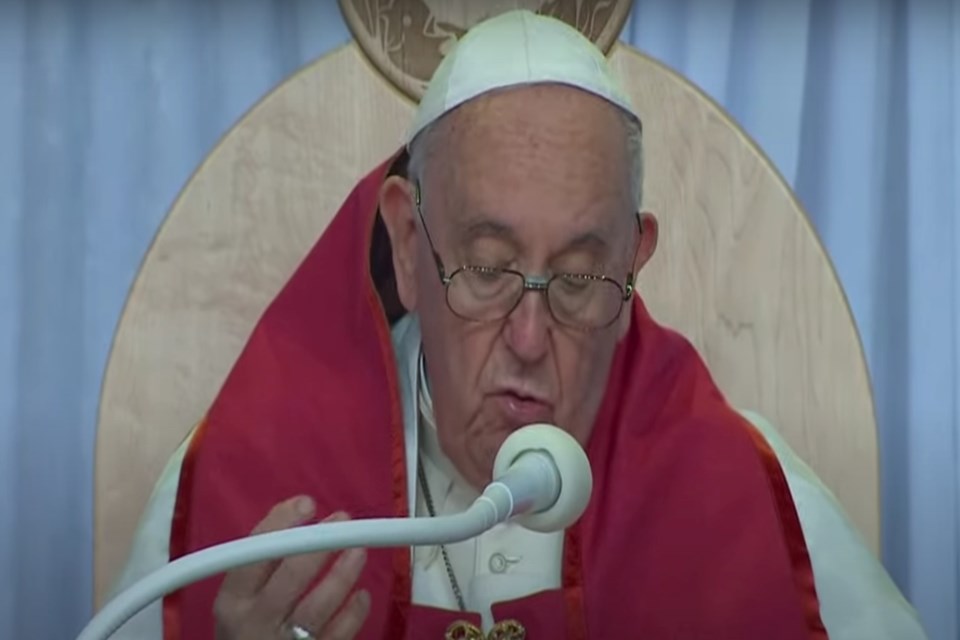ATHABASCA — He did apologize several times in his statement made at Commonwealth Stadium July 26, but it wasn’t enough for some local members of the Indigenous community.
Emotions ranged from outrage, to tears, to glimmers of hope, but for many the apology made by Pope Francis on behalf of the Catholic Church for its role in the mistreatment people and destruction of their cultures, didn’t scratch the surface of the pain they have endured.
“Such an emotional, angry, disappointing time for us this week,” said Calling Lake resident Linda Gladue July 26 shortly after the speech concluded. “Waste of money better spent on many important issues Indigenous people still face.”
Throughout his speech Pope Francis referenced colonizers and Christians, but some felt he never quite accepted any blame for the actions of those representing the Catholic Church or its operations of residential schools across North America.
“I am here … telling you once more that I am deeply sorry. Sorry for the ways in which, regrettably, many Christians supported the colonizing mentality of the powers that oppressed the Indigenous Peoples ... I ask forgiveness, in particular, for the ways in which many members of the church and of religious communities co-operated ... in projects of cultural destruction and forced assimilation promoted by the governments of that time, which culminated in the system of residential schools,” he said.
Gladue wasn’t accepting it.
“This was a sham visit by pathetic Catholic leadership and unwillingness of acknowledgement,” she said. “The lack of acknowledgment of the sexual abuse was a deliberate protection of the church (by) a cowardly old man.”
She won’t even call them residential schools.
“The sexual abuse reached a lot further than the residential prisons and day schools,” she said. “There were young people in our small community who were sexually assaulted by trusted priests.”
She also noted there was no mention of the little children who were murdered by the church.
“I’m so emotional right now, I look at our grandchildren and can't even imagine or want to imagine the horror the little innocent people went through,” Gladue said. “I can't stop the tears.”
Marvin Nipshank now lives near Edmonton but is originally from Calling Lake, he was not impressed either.
“I thought only the woman whose own version of ‘O Kanata’ and her short tirade after showed any true meaningful gesture to this papal visit,” he said July 26. “It was powerful and actually opened many non-Indigenous eyes and really hit home for our people. Other than that, the apology given by the Pope meant absolutely nothing to the majority, neither did his Lac Ste. Anne visit.”
Si Pih Ko, also known by her English name Trina Francois, instantly became a powerful symbol in a spontaneous moment when she rebuked the apology from Pope Francis live and unscripted July 26.
Like many others, Nipshank felt it shouldn’t have fallen on Canadians to pay so much for a visit from someone sitting on some of the largest wealth in the world.
“I don't think Canadian citizens should have footed the bill for this visit,” he said. “The Catholic Church is who needs to correct all the horrible wrongs they did so they should have.”
He does feel the visit was successful but not in the way the Vatican intended.
“Ironically, in a different way, this visit was positive in many other ways (because) it angered people and opened the eyes of the general public and we gained some sympathizers, for lack of a better word; I read many posts and a lot of the comments came from non-Indigenous,” said Nipshank.
Darren Mullen only had one observation.
“The Catholic religion is pure evil, always has been,” he said July 31. “What they did to the (Indigenous) people was absolutely appalling.”
For Alma Swan, the decision to go to Commonwealth Stadium was a hard one.
“I'm still processing it,” she said in a phone call July 31. “I had no intentions of going, but then things fell into place … and then I thought of my role in education for reconciliation, I felt that I needed to go there because I did go to the closing ceremony for the Truth and Reconciliation Commission.”
Swan works for Aspen View Public Schools in Athabasca as the First Nations, Métis, and Inuit liaison and a large part of that is working on truth and reconciliation.
“The Pope has given direction to the bishops,” she said. “Now they have to put things in place to move forward but there's lots of First Nations people that are really struggling.”
Like Si Pih Ko, who burst into song, in a reaction to seeing the Pope presented with a headdress.
“I don't believe for one second that it was the time or the place to give the Pope a headdress because you have to earn a headdress and he hasn't earned it yet,” Swan said.
But, even if others aren't ready to accept an apology or feel it wasn't enough, Swan does hold a glimmer of hope.
“We have to start somewhere and we're all in this together,” she said. “So, if we take anything out of the Pope's apology, maybe it's acknowledging that we need to take a step forward because I don't think we've taken that step forward yet, but at least it's put the put the wheels in motion.”



